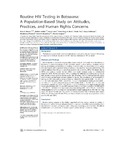Routine HIV testing in Botswana: a population-based study on attitudes, practices, and human rights concerns

View/
Date
2006Author
Weiser, S.D.
Heisler, M.
Leiter, K.
Percy-de Korte, F.
Tlou, S.
DeMonner, S.
Phaladze, N.
Bangsberg, D.R.
Iacopino, V.
Publisher
PLoS Medicine. www.plosmedicine.orgType
Published ArticleMetadata
Show full item recordAbstract
Background
The Botswana government recently implemented a policy of routine or "opt-out" HIV testing
in response to the high prevalence of HIV infection, estimated at 37% of adults.
Methods and Findings
We conducted a cross-sectional, population-based study of 1,268 adults from five districts in
Botswana to assess knowledge of and attitudes toward routine testing, correlates of HIV
testing, and barriers and facilitators to testing, 11 months after the introduction of this policy.
Most participants (81%) reported being extremely or very much in favor of routine testing. The
majority believed that this policy would decrease barriers to testing (89%), HIV-related stigma
(60%), and violence toward women (55%), and would increase access to antiretroviral
treatment (93%). At the same time, 43% of participants believed that routine testing would
lead people to avoid going to the doctor for fear of testing, and 14% believed that this policy
could increase gender-based violence related to testing. The prevalence of self-reported HIV
testing was 48%. Adjusted correlates of testing included female gender (AOR ¼ 1.5, 95% CI ¼
1.1–1.9), higher education (AOR¼2.0, 95% CI¼1.5–2.7), more frequent healthcare visits (AOR¼
1.9, 95% CI ¼ 1.3–2.7), perceived access to HIV testing (AOR ¼ 1.6, 95% CI ¼ 1.1–2.5), and
inconsistent condom use (AOR ¼ 1.6, 95% CI ¼ 1.2–2.1). Individuals with stigmatizing attitudes
toward people living with HIV and AIDS were less likely to have been tested for HIV/AIDS (AOR
¼ 0.7, 95% CI ¼ 0.5–0.9) or to have heard of routine testing (AOR ¼ 0.59, 95% CI ¼ 0.45–0.76).
While experiences with voluntary and routine testing overall were positive, 68% felt that they
could not refuse the HIV test. Key barriers to testing included fear of learning one’s status
(49%), lack of perceived HIV risk (43%), and fear of having to change sexual practices with a
positive HIV test (33%).
Conclusions
Routine testing appears to be widely supported and may reduce barriers to testing in
Botswana. As routine testing is adopted elsewhere, measures should be implemented to assure
true informed consent and human rights safeguards, including protection from HIV-related discrimination and protection of women against partner violence related to testing.
